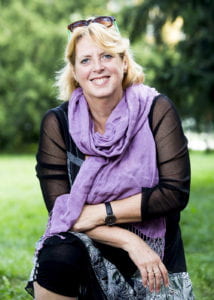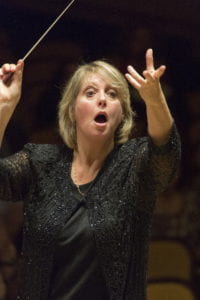 The Czech Republic has one of Europe’s strongest music education programs, and children as young as 15 can start learning to conduct at the conservatory (students in the USA don’t start learning to be conductors until much later, usually after they have completed a BA degree). This semester NYU Prague’s music students can take a new course on conducting taught by Miriam Nemcova, who is the second Czech woman to become a professional conductor.
The Czech Republic has one of Europe’s strongest music education programs, and children as young as 15 can start learning to conduct at the conservatory (students in the USA don’t start learning to be conductors until much later, usually after they have completed a BA degree). This semester NYU Prague’s music students can take a new course on conducting taught by Miriam Nemcova, who is the second Czech woman to become a professional conductor.
The first professional Czech female conductor was Vitezslava Kapralova who was also the first woman to earn a conducting degree from the Janacek Academy in 1935. She had a very successful early career, conducting the Czech Philharmonic in 1937 and the BBC Symphony Orchestra in 1938. Tragically she died of tuberculosis at the age of 35.
It took sixty years for another female conductor to appear on the Czech music scene. It hasn’t been easy. The first time Nemcova applied to the conducting program at the Prague Music Academy in 1983 she wasn’t accepted. Not only was she female, but she was also religious, and the Communist regime was in control of the educational system. She was criticized for wearing a cross when she conducted an orchestra for a concert that took place just before her audition for school. Nemcova persevered, and she was accepted the following year. Throughout her studies and early in her career colleagues and teachers told her that they didn’t think women have the authority necessary to conduct an orchestra. Nemcova, whose mother was a well-known opera singer, ignored the criticism, believing that when you conduct, you shouldn’t display either female or male attributes.
 A few years after graduation Nemcova was offered the prestigious position of conductor and choir master of the State Opera in Prague where she worked for several years. She later spent six years in Italy, conducting choirs and orchestras around the country, and she has recorded CDs with the Hradec Kralove Philharmonic Orchestra and conducted film music for many Czech and international productions.
A few years after graduation Nemcova was offered the prestigious position of conductor and choir master of the State Opera in Prague where she worked for several years. She later spent six years in Italy, conducting choirs and orchestras around the country, and she has recorded CDs with the Hradec Kralove Philharmonic Orchestra and conducted film music for many Czech and international productions.
Nemcova is optimistic that the prejudices against women are slowly disappearing in her field, in part because of her own role at the music academy where she has taught for over twenty years, mentoring her female students. “I have trained at least ten females to be conductors. Still, after graduation not very many of them work professionally. Being a female conductor is complicated. It’s difficult in terms of time but also difficult physically, especially when you have a family and children. A lot depends on having support from your family and also your financial situation.”
Recently Nemcova conducted a concert of Dvorak and Smetana with the Cairo Symphony Orchestra in Egypt at an event organized by the Czech Embassy. She was a bit nervous approaching them as a woman. “But the musicians respected my position – hierarchy was more important than gender to them. A maestro is a maestro – doesn’t matter if that maestro is a woman or man.”